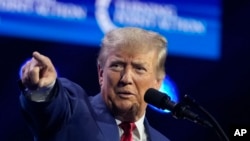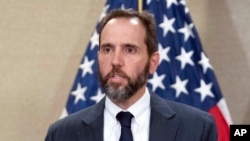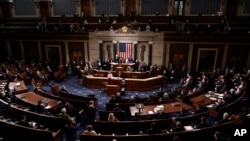Former President Donald Trump says he is on the verge of being indicted. Again.
Writing on his Truth Social platform, Trump disclosed on Tuesday that he’d been informed by special counsel Jack Smith that he’s a “target” of Smith’s investigation into the January 6 riot at the U.S. Capitol and efforts to overturn the outcome of the 2020 presidential election.
The former president wrote that he received the notice on Sunday night and was given four days in which he could make a voluntary appearance before a grand jury that has been investigating him.
Sending a target letter “almost always means an Arrest and Indictment,” Trump wrote.
Legal experts agreed that the monthslong special counsel investigation of Trump appears to be wrapping up with an indictment all but imminent.
A target letter is “almost always issued shortly before a grand jury is asked to return an indictment,” said Paul Rosenzweig, a former federal prosecutor who is now a senior fellow at the American University’s Tech, Law & Security Program.
This would be Trump’s second federal indictment in as many months.
Last month, he was indicted for allegedly mishandling classified documents after he left the White House in 2021, becoming the first former U.S. president to face federal charges. Trump has pleaded not guilty in the case and has blasted the special counsel probe as “election interference.”
Trump was issued a target letter about 20 days before being indicted in the documents case. Legal experts say a second federal indictment of the former president could take as much or less time.
Here is what you need to know about the case that could lead to Trump’s second federal indictment:
What is the special counsel investigation?
The special counsel inquiry into Trump in part grew out of the Justice Department’s massive probe into the January 6, 2021m assault on the Capitol by Trump supporters.
Initially focused on hunting down the rioters, investigators subsequently expanded their scope to look into efforts by Trump and his associates to overturn Joe Biden’s victory in the 2020 presidential election.
The investigation accelerated after Attorney General Merrick Garland, citing Trump’s run for re-election, appointed Smith as special counsel last November.
Smith was tasked with pursuing two separate lines of inquiry into Trump. The first involved Trump’s mishandling of classified documents, which resulted in his indictment last month. The second examined Trump’s role in the events leading up to January 6.
What is the investigation focused on?
Smith has kept his investigation under wraps, promising only to conduct it “expeditiously and thoroughly” based on facts and the law.
But public reporting indicates that the special counsel has been pursuing multiple leads.
One involves efforts by Trump and his associates to create slates of fake electors from seven battleground states that Biden had won. The electors signed false certificates that Trump had won those states, contradicting the official result. On Tuesday, prosecutors in Michigan announced charges against 16 Republicans who allegedly served as “fake electors” in 2020.
A second line of investigation has focused on a campaign by Trump and others to get then-Vice President Mike Pence to block Congress from certifying Biden’s win. Pence refused, saying he had no power to change the Electoral College outcome and that his role in the process was only ceremonial.
A third lead focuses on Trump’s post-election fundraising. The January 6 Committee found that Trump’s campaign and the Republican National Committee had raked in more than $250 million in donations by falsely claiming that the election had been stolen and that he needed money to fight fraud.
What possible charges could Trump face?
With so many lines of inquiry, legal analysts caution against speculating on the potential charges against Trump.
“There are so many threads to Donald Trump's activities on January 6 that it is difficult to really accurately predict which particular thread the prosecutor has decided to pull,” Rosenzweig said. “I don't think we will know until we see the details.”
Nevertheless, the special counsel’s target letter hints at some possible charges.
The letter cites three criminal statutes in relation to the investigation of Trump, according to news reports — conspiracy to commit offense or defraud the United States; deprivation of rights under color of law; and tampering with a witness, victim or informant.
The three statues cover a wide range of crimes, and legal experts cautioned that it would be speculative to guess how prosecutors might use them in an indictment of Trump.
“I assume, although … one cannot be sure, that the conspiracy charge here refers to an effort to bring knowingly fraudulent electors forward and to concoct the scheme to at the very least delay the congressional vote or at the most to derail it,” said Daniel Richman, a Columbia University law professor and a former federal prosecutor.
The law on “deprivation of rights under color of law” is often used to prosecute police brutality.
“But the statute has many other uses, and it might involve, let’s say, an effort to deprive individuals or sets of individuals of some statutory right that needs to be respected by virtue of some law to that effect,” Richman said.
“This statute has so many various uses that it is really impossible at this stage to guess at which particular rights are alleged to have been violated in this case.”
In its final report, the House committee that investigated the January 6 attack recommended that the Justice Department charge Trump with inciting an insurrection, conspiracy to defraud the United States and obstruction of an official proceeding.
But the special counsel makes no reference to insurrection or sedition in his letter, suggesting he either does not intend to pursue the charge or plans to bring it later through a superseding indictment, according to legal experts.
Who else could be charged?
Whether Smith plans to charge any co-conspirators in the alleged scheme to keep Trump in office remains unclear. None of the former president’s allies is believed to have received a target letter in connection with the case.
But that could change in the coming days and weeks. And if Trump is indicted, it is likely that he would be charged along with others, said Jordan Strauss, a managing director at Kroll, a financial and risk advisory firm, and a former federal prosecutor.
That is because “some of the crimes likely to be charged would require acting with others — ‘conspiracy,’” Strauss said.






